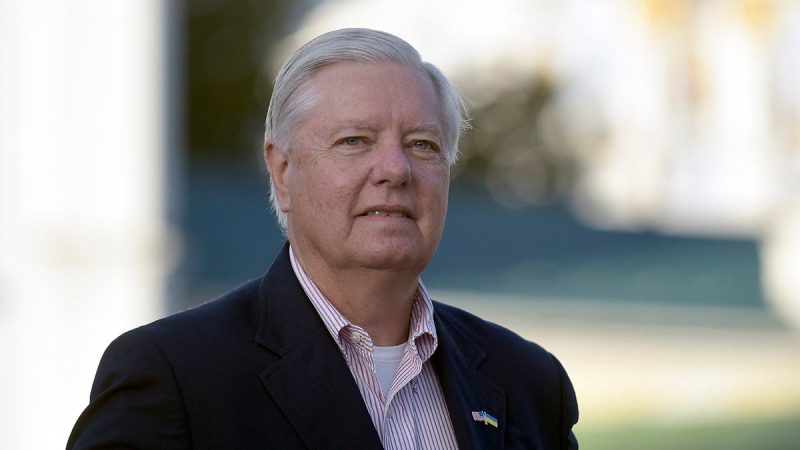
Graham: Israel should threaten to ‘blow up’ Iran’s oil refineries if hostages don’t come home
Sen. Lindsey Graham, R-S.C., recommended that Israel threaten to ‘blow up’ Iran’s oil refineries if the remaining hostages taken by Hamas during the Oct. 7 terrorist attack are not released soon.
Appearing on CNN’s ‘State of the Union,’ Graham was asked to respond to Israel’s military reporting that it launched preemptive strikes that struck and destroyed thousands of Hezbollah rocket launchers in Lebanon before a planned attack on Israel this weekend, as well as the hostage and cease-fire talks that are resuming in Cairo, Egypt, on Sunday.
‘How should the U.S. respond to what’s going on in the Middle East? And what is your message to get the cease-fire and hostage release deal across the finish line?’ CNN’s Jake Tapper asked the senator.
‘Well, number one, I think we got to remember that October the 7th attack was generated, in my view, to stop normalization between Saudi Arabia and Israel. It’s a nightmare for Iran and her proxies, for the Arabs and Israelis to reconcile and make peace and take the region in a different direction,’ Graham said. ‘As to the hostages, I would hold Iran responsible for their well-being.’
‘If I were the state of Israel, I would tell the ayatollah, if these people do not come home alive – the ones that are left alive – and if we don’t get the bodies of the fallen, we’re going to blow up your oil refineries,’ Graham added. ‘That’s the only way you’re ever going to get the hostages released is to put pressure on Iran.’
Israeli Prime Minister Benjamin Netanyahu on Sunday vowed more ‘surprising blows’ against Iran-backed terrorist groups after the Israel Defense Forces (IDF) reportedly struck launch sites in Lebanon just minutes before Hezbollah was planning to fire thousands of rockets into central Israel.
‘What happened today is not the end of the story. Hezbollah tried to attack the State of Israel with rockets and drones early in the morning,’ Netanyahu said at a government meeting in Tel Aviv. ‘We instructed the IDF to carry out a powerful preemptive strike to remove the threat.’
Michael Herzog, Israeli ambassador to the United States, said in an appearance on CBS’ ‘Face the Nation’ that the IDF operation prevented a wider conflict.
‘We identified concrete planning and preparation by Hezbollah to launch a massive missile and drone attack into Israel,’ Herzog said. ‘And we carried the real-time operation in order to degrade those capabilities that were about to be launched as well. We were successful. And nevertheless, they launched several hundred rockets into Israel and also drones that were aimed at central Israel. And we intercepted all of them. One of our soldiers was killed by the debris of Israeli interceptors.’
‘I believe that the success of our operation yesterday prevented an escalation to a major war,’ he added. ‘This threat is still there. We still need a settlement with Hezbollah in southern Lebanon.’
Israel faces Iran-backed terrorist groups on multiple fronts: Hamas in Gaza, Houthis in Yemen and Hezbollah in Lebanon. The war in Gaza began when Hamas and other terrorists staged a surprise attack on Israel on Oct. 7, killing around 1,200 people, primarily civilians. Hamas is believed to still be holding around 110 hostages. Israeli authorities estimate about a third are dead.
Israel’s military announced the deaths of four more soldiers in combat in central Gaza on Friday.
In Egypt, the U.S. delegation, led by CIA Director William Burns and White House Middle East adviser Brett McGurk, held talks with senior Egyptian officials and then with Egyptian and Qatari mediators, according to a person familiar with the ongoing talks who spoke on condition of anonymity because they weren’t authorized to comment publicly.
The Egyptian and Qatari negotiators were expected to meet with Hamas officials on Saturday evening. Hamas won’t take part directly in Sunday’s talks but will be briefed by Egypt and Qatar, senior Hamas official Mahmoud Merdawy told The Associated Press. Merdawy said Hamas’ position hadn’t changed from accepting an earlier draft that would include the full withdrawal of Israeli forces from Gaza.
An Israeli delegation that arrived Thursday included the heads of the Mossad foreign intelligence service and Shin Bet security service and Maj. Gen. Eliezer Toledano.
The U.S. has been pushing a proposal that aims at closing the gaps between Israel and Hamas as fears grow over a wider regional war after the recent killings of leaders of the Hamas and Hezbollah terrorist groups, both blamed on Israel.
President Biden called Netanyahu on Wednesday to stress the urgency of reaching a deal and discussed developments with the leaders of Qatar and Egypt on Friday.
The Associated Press contributed to this report.



